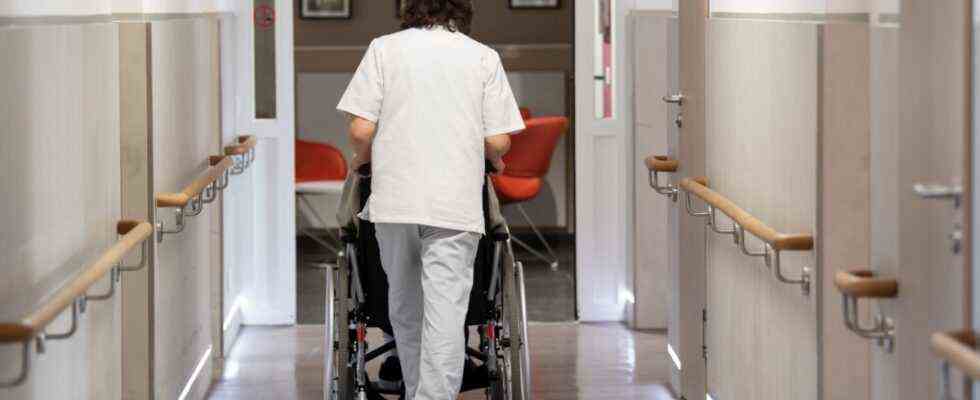“At the moment I am one of the lucky ones, because the quota of skilled workers has been met in our company. But we are desperately looking for two nursing assistants,” says Volker Breitenwieser (name changed). But he can no longer find any on the job market. Breitenwieser, who runs an old people’s and nursing home in north-east Bavaria, now even uses eBay classifieds when searching for personnel. “I search, search and search, but where are people supposed to come from all of a sudden,” he says. Ros-witha Seifert, head of nursing in a central Franconian hospital, has to resort to temporary employment agencies so that the stipulated minimum staffing levels can still be met – otherwise the clinic would face fines.
The costs for hired labor are high, says Seifert (name changed). For a nurse in intensive care, the hourly rate is currently around 78 euros plus VAT. This causes discomfort in clinic management, but there shouldn’t be any fines either. According to the results of a study by the Hans Böckler Foundation, this is “a development that has evidently been strengthening recently”. Nursing staff in the clinic sector are therefore increasingly switching to temporary employment agencies “in order to finally have regulated and reliable working hours and to be able to prevent work overload”. And the job market from Seifert’s point of view: swept empty.
“For Bavaria, in a pre-Corona survey, we extrapolated to 12,000 acutely shortage of full-time nurses in our hospitals,” says Robert Hinke, head of the health, social services, welfare and churches departments at Verdi Bayern. But since around half of the nursing staff work part-time, this number can “confidently be doubled”. In the area of care for the elderly, it looks no less dramatic. “Conservative projections assume a staff shortage of 47,945 employees in inpatient care and 14,149 employees in outpatient care by 2030,” Hinke quotes from studies.
The Ministry of Health is aware of such figures. A new report from the Iges Institute was only presented in the middle of this week. “A shortage of skilled workers is to be expected,” said a ministry spokesman, summarizing the results. In long-term care – for example in the approximately 1690 homes in the Free State of which Volker Breitenwieser is head of one in northeast Bavaria – “more than 32,000 more skilled nurses and almost 30,000 more nursing assistants” will be needed by 2050. Since full-time employees are also calculated here, the actual need is much higher. Numbers that make you dizzy – all the more so since the Iges study comes to the conclusion that 62.8 percent of the shortage of skilled workers is responsible for the reduction in long-term care places.
This Friday, Klaus Holetschek (CSU), the minister responsible for health and care in Bavaria, visits the theater performance of the local secondary school in Affing in Swabia. Constantly falling incidence values now give him the time for it. The piece he is looking at is intended to arouse young people’s curiosity about the nursing profession. Holetschek was also there when nurses recently demonstrated in Munich for their concerns. He showed solidarity, held up a banner with sisters. “There won’t be an immediate solution,” he says – when asked about the problems. It is important to him “to get in touch with those who are involved in nursing or who are still in training”.
He also says that the problems have “been there for a while”. So what went wrong in Bavarian care policy? “The view in the rearview mirror is not mine,” he says. In the short to medium term, he aims to encourage the re-entry of nursing staff – i.e. those who have turned their backs on their jobs. At the moment, as he says, Holetschek keeps getting feedback from nurses that the corona pandemic has “broken the barrel” for them. Back to the solutions: mentoring programs to prevent dropping out of nursing training. In addition, more practical instructions, less bureaucracy with care documentation.
“I would also like to get in touch with the municipal umbrella organizations as soon as possible in order to consider how we can organize care in the municipalities even better,” says Holetschek. This is also urgently required. At least this is what the Iges study suggests. There it says on the shortage of skilled workers in nursing: “Despite this development that has been foreseeable for a long time, 41 percent of the districts and independent cities in Bavaria have not undertaken any nursing planning in the last five years.” Holetschek has big ideas in mind, he already has a suitable slogan in mind: “Good care at home in Bavaria”. As far as his own house is concerned, he is thinking of expanding the State Office for Care into “a think tank for care”.
A change in social legislation is required at the federal level. “It cannot be that care is based on billing,” says Holetschek. He recently announced increased financial support for nursing homes. He has also pushed for “tax incentives for nursing professions”. Implementing the latter is also a federal matter. Behind the scenes, it is said at the association level that the minister is “happy to make demands in favor of care that Bavaria does not have to finance”. He was “traveling very cheaply”. Holetschek, meanwhile, emphasizes: “It shouldn’t just be hot air, I really want to change something.” There is a lot to tackle. The list of measures that are necessary from the point of view of the Association of Nurses in Bavaria alone fills five pages.

